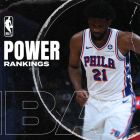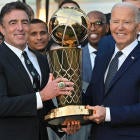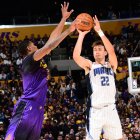When Kemba Walker earned third-team All-NBA honors and the accompanying supermax eligibility, the widespread belief around the league was that he would eventually come to terms with his Charlotte Hornets on a new long-term deal. Walker made it clear that would have been his preference, telling Jared Weiss of the Athletic in early June that re-signing with the Hornets was his "first priority." Yet when free agency came, Walker traded in his teal uniform for green and signed with the Boston Celtics. As Shams Charania of the Athletic revealed on Wednesday, the Hornets just didn't make a compelling enough offer for him to stay.
Walker was eligible for a five-year deal starting at 35 percent of the salary cap, which would have totaled $221 million. But due to the constraints Charlotte was operating under, Walker sensed that he wouldn't receive such an offer.
"Tough days, f-----g tough days, I can't even lie," Walker told The Athletic. "Excuse my language. It was difficult. I couldn't see myself just being on another team. It was just hard. That's all I've known was Charlotte. Definitely some tough times. I had a feeling that I wasn't going to get the offer that I wanted, and maybe not close to it, because of cap space."
Still, if the Hornets had come close and offered a deal in the neighborhood of a traditional five-year max of $190 million, Walker was prepared to stay. Their final offer came in far lower than that. It was for less than $160 million over five years, according to Charania. That deal would have paid him quite a bit less on average ($32 million per year) than a max offer from another team ($142 million over four years, so $35.5 million per year).
While the Hornets had the ability to offer more than any other team, their books were not clean enough to do so without consequence. Charlotte entered free agency with around $102 million in committed salary factoring in their draft picks. The luxury tax line was set at $132,627,000. Signing Walker to the contract offered to him would have meant paying the tax for the first time under Michael Jordan's leadership.
The Hornets are one of the lowest-revenue teams in basketball, and more importantly, they haven't made the playoffs in three seasons. Paying the tax would have been disastrous for them. They could have ducked under it after the fact, but doing so may have cost precious draft capital. Given the realistic restraints of existing in Charlotte, the Hornets simply couldn't justify making Walker an offer commensurate with his ability.
Also worth noting: Walker has a player option for the 2022-23 season. That could get him to free agency again at the age of 32. Teams typically aren't enthusiastic about paying small guards at that age, but only a year ago, Chris Paul secured a four-year, $160 million deal from the Houston Rockets at the age of 33. Had Walker committed to five full years in Charlotte, his chances at landing another big contract at 34 were fairly slim.
The deciding factor for Walker, though, was the opportunity that the Celtics presented. "Point guards can have great success under coach," Walker said. "Obviously Kyrie [Irving] left, so it was an open point guard spot. It was just perfect. Boston is such a historic place. Who wouldn't want to play for the Celtics?"
Walker did not get to finish his career with the Hornets as he'd originally hoped, but the Celtics present a different sort of opportunity. He has made the playoffs only twice in his career. The Celtics have missed the playoffs only once in that span, and have reached the Eastern Conference finals three times. Walker will have a chance to compete on a young and talented Celtics team. Such a chance was not going to be available in Charlotte for the foreseeable future.

















